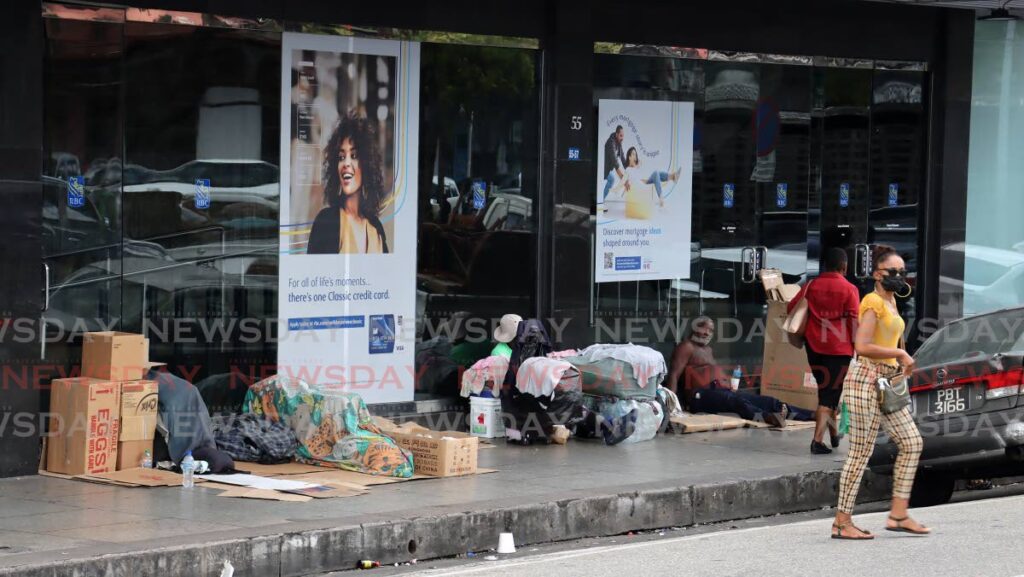Psychology of social displacement: The many faces of homelessness

OFTEN, society overlooks the fact that there are different categories of socially displaced people when discussing the topic of homelessness.
Among them are people who suffer from mental illness or addiction – and those who simply choose to be on the streets.
Psychologist Sule Joseph, in an interview with Newsday, said a one-size-fits-all solution cannot apply, as the socially displaced community comprises different demographics with unique needs and challenges.
"By understanding the complexities behind homelessness, society can better assist the socially displaced population, providing them with the support, opportunities, and empathy they need to transition towards stable and fulfilling lives."
He believed homelessness cannot be addressed until authorities concede the psychological complexities.
For instance, "There is a psychological aspect to people that draws them back to the spaces and social groups in which they feel most comfortable and safe. This attachment to relationships formed on the streets, as well as the street itself, contributes to the difficulty of permanently reversing the issue.
“That emotional attachment to the relationships they would have created while on the streets and the attachment to being on the street, with regard to the socially displaced, is not a question of whether it's reversible or not reversible.
"Unless they address the psychological rationale and reasons for why persons are on the streets, they will return. If it’s addiction-related, no matter what fancy place they put them in, persons will get the cravings for the addiction and they will return to doing whatever they were doing."
A mental battle
Joseph said studies, although limited in number, have revealed that a cross-section of individuals facing mental health issues battle conditions such as schizophrenia and bipolar disorder
But society often dismisses these individuals as "mad" or "crazy" without recognising the underlying mental health struggles they endure.
In TT, unless mentally ill people pose a danger to themselves or others, they cannot be placed in mental health facilities against their will. Consequently, many of those suffering from mental illness find themselves on the streets, as their specific needs cannot be met by relatives.
“It’s more...about addressing the thought pattern and understanding them, and understanding that they are not a homogeneous group. There are different persons with different issues and different reasons.
"When we talk about the person who does not want to be on the street, who is an unwilling participant to being destitute, if you provide them with opportunities, (they'll) grab it with both hands and run, because they don't want to be there.”
Another significant contributor to social displacement is addiction. Those with a drug, gambling, or alcohol addiction may end up on the streets, driven by their desperate need to satisfy their cravings. While living on the streets is not an ideal scenario, they prioritise feeding their addiction over finding shelter or sustenance.
This aspect of addiction reflects its classification as an illness, as the addiction comes before securing basic necessities. Joseph said understanding this perspective is crucial in identifying the underlying motivations and needs of socially displaced people struggling with addiction.
Personal choice, individual values
Additionally, some people choose to be homeless as they veer away from societal norms and embrace a simpler, stress-free life.

Joseph pointed out their decision to opt out of the traditional rat race stems from a desire to live without limits and avoid the pressures of a capitalistic society. This personal choice creates a perception that all socially displaced individuals suffer from mental illness or addiction, when this is not the case.
“If this person prioritises freedom and happiness as important, that’s about as crazy as somebody prioritising financial success. The person who is satisfied with having nothing, is happy with just existing, is probably looking at the people with shirt and tie who are killing out themselves for financial freedom as the crazy person.”
Societal shift and vulnerability
Joseph felt pressures from society and a shift towards a more capitalist culture can push vulnerable people into near-homelessness.
“Our culture is moving away from more traditional values and more into our capitalist functioning. In that capitalist structure, the idea is, the strong survive and weak just fall by the wayside.
"That type of thinking can contribute to those who are not mentally ill, (and do) not have any addiction, (being) destitute, homeless. Our culture can gradually push those persons to have a very similar type space or function.”
He said the prevailing belief that "the strong survive" carries on the cycle of displacement.
“Our culture prioritises material gain and individual success, often neglecting the most vulnerable members of society. This societal shift and the accompanying judgment and scorn further marginalise individuals who do not conform to societal norms of financial success and material possessions.”
Rehabilitation challenges
Efforts to rehabilitate socially displaced people have faced significant obstacles.
After Port of Spain's Riverside Plaza homeless facility was closed earlier in 2023, the Ministry of Social Development and Family Services met resistance trying to relocate its residents according to their needs.
Also, many of them opted to stay on the streets, and others, who would otherwise have accepted the help, grew frustrated over the rules at government facilities and eventually returned to the street.
For instance, addressing addiction-related homelessness is not as simple as providing a luxurious facility, Joseph said, since the individual will inevitably experience cravings and relapse if the psychological roots of addiction remain unaddressed.
Similarly, without addressing mental health issues and the thinking patterns that contribute to homelessness, it is challenging to guide people toward a more stable living situation. Reversing these situations necessitates a thoughtful approach that considers their unique circumstances and needs.
Joseph also reminded that the public must understand that prioritising freedom and happiness, even if it means embracing homelessness, does not automatically indicate mental illness, and it's simply that for some people, less is more.
"The psychologically driven motives behind each person's decision should be at the forefront to effectively address their needs. The thinking pattern of the social displaced has to be addressed.”

Comments
"Psychology of social displacement: The many faces of homelessness"